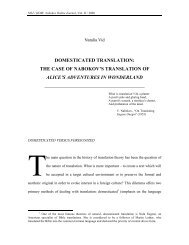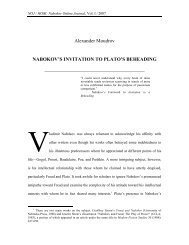You also want an ePaper? Increase the reach of your titles
YUMPU automatically turns print PDFs into web optimized ePapers that Google loves.
Nabokov Online Journal, Vol. V (2011)<br />
_______________________________________________________________________<br />
In this connection, Pia Pera stands, to Dmitri Nabokov, as a glaring object lesson<br />
on the phenomenon of the inattentive reader, her interpretation of Lolita allowing him to<br />
reiterate the concept of aesthetic value so central to his father’s oeuvre. The son’s method<br />
of paying Pera back for being a bad reader of his father is to badly read her novel,<br />
willfully refusing to acknowledge its parodic distancing. While the lawsuit hinged upon<br />
disproving parodic purpose (under the fair use clause, a protected category), I would<br />
argue that the threat of parody – that is, the fact that Lo’s Diary represents not merely an<br />
imitation, but also an ideological challenge – is precisely what inspired these legal<br />
proceedings in the first place. In Vladimir Nabokov’s work, parody transcends that which<br />
is clichéd and criminal; hence it provokes both aesthetic and ethical questioning, and<br />
constitutes a potent form of attack. In Pera’s parody, what is under attack is the validity<br />
of Nabokov’s aesthetic views. The strongest defense against parody, meanwhile, is to not<br />
acknowledge it as such, to ignore its ideological critique. When Dmitri Nabokov writes<br />
that feminists had “mixed feelings” about the Lolita that emerges in Pera’s novel as, in<br />
his words, a “calculating harpy” (“On a Book Entitled Lo’s Diary” viii), he is making the<br />
case that Lo’s Diary fails to ideologically transform. (The implication being that all that<br />
is left is imitation.) In this narrow regard, he is right, of course; Pera’s parody is not<br />
motivated by feminist critique. But, as Dmitri Nabokov must have understood, the book<br />
does have a transformative program; hence my assertion that his objection was not so<br />
much to its potential damage to its source-text’s monetary value, but rather its parodic<br />
challenge to the aesthetic value system of that source-text.<br />
Using Pera’s novel’s non-feminism to deny any parodic purpose on the part of the<br />
work, and so to treat it merely as a copyright infringement, an unlicensed, and poor,<br />
reproduction of a superior artifact, Dmitrii Nabokov ignores its critique. Beyond this,<br />
however, he uses the opportunity of his foreword to defend his father’s aesthetic<br />
philosophy against Pera’s attack, using Pera’s own case for support. Pointing to Pera’s<br />
obscene reading of his father’s novel, which rejects aesthetic judgment as a saving grace,<br />
Dmitri Nabokov argues that such a dismissal of aesthetics is in fact a crime. His use in his<br />
preface of the initials “PP” for Pia Pera, reminding us of the “H. H.” of Nabokov’s novel,<br />
suggests that akin to H. H., PP is a parasite who has used and abused Lolita: “Outright<br />
piracy persists in Russia, and in the Western world, as some readers may know, one Pia<br />
20

















